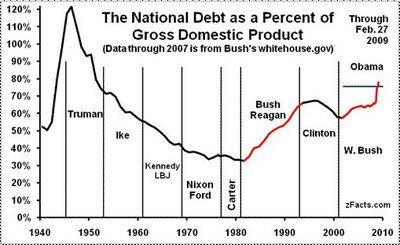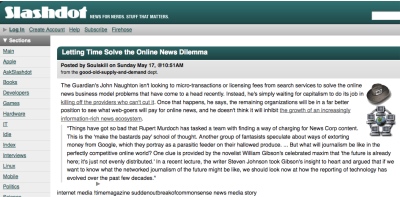You’d need to be a psychiatrist to understand what’s going on in the heads of US Republican politicians at the moment. At the moment, for example, many of them are rewriting history to ‘prove’ that FDR’s New Deal was a ‘failure’. Russ Daggatt has a nice rant about this on Mark Anderson’s blog.
Former New York Senator and UN Ambassador, Daniel Patrick Moynihan famously said, “Everyone is entitled to his own opinion, but not his own facts.”
Increasingly, it seems, Republicans are trying to create not only their own facts but their own reality. This is particularly problematic when the mainstream media treats every issue as some kind of polarized “Crossfire” debate, with “balanced” treatment of “both sides.” Hence, we can end up with mainstream media “debates” over things like evolution, global warming and even torture.
A few years back Paul Krugman commented on the media desire for “balance” over objectivity. As an example he said that if Bush proclaimed the world was flat, the headline in the New York Times the next day would be “Shape of The World, Views Differ.” Indeed, that would be a “balanced” portrayal of the “debate” over the shape of the Earth. But objectively, the world is spherical. Stating that fact is not “bias” (except to the extent reality is a bias). Even if a large group of people – like the entire remaining rump of the Republican Party – disputed that fact, the New York Times would be doing its readers a disservice to give the impression that there was any credible, objective basis for the dissenting view.
At the Future in Review Conference in San Diego last year, Harvard professor James McCarthy, former co-chair of the Intergovernmental Panel on Climate Change, was asked how many of the world’s top 1000 climate experts would disagree with the basic scientific consensus that the increase in greenhouse gas concentrations over the last 50 years to levels not seen in 650,000 years is primarily anthropogenic. He replied, “Five.” (He also told an amusing anecdote about a colleague being asked the same question at a conference and answering, “Ten.” McCarthy went up to him later and asked how he got to ten. The guy replied that he could only think of five – the same five as McCarthy – but doubled the number to provide a margin of error.) That is about as solid a scientific consensus as you are ever likely to get for such a complex set of phenomena. Yet it is almost an article of faith in Republican circles these days that the threat from global warming is at best greatly exaggerated and at worst a “hoax.”
I’m not even going to waste time with evolution. If you think there is a legitimate debate over evolution, don’t even bother to read further…
Russ’s piece has two interesting graphs. One shows that GDP rose steadily through FDR’s time in office. The other graph is of US national debt as a percentage of GDP.

Rather puts Obama’s measures in context, doesn’t it?


